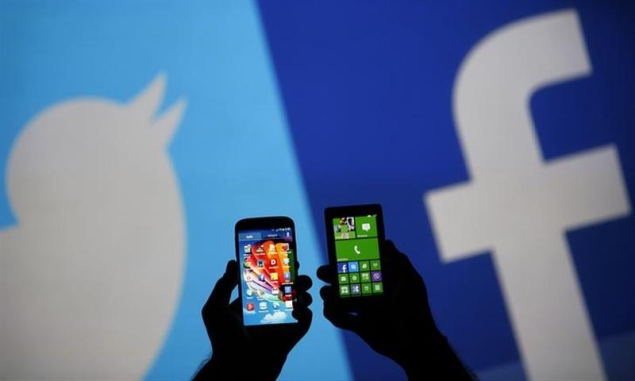- Home
- Social networking
- Social networking News
- Facebook, Twitter Behavioural Data Fraught With Biases: Study
Facebook, Twitter Behavioural Data Fraught With Biases: Study

Behavioural scientists use social media to quickly and cheaply gather huge amounts of data about what people are thinking and doing but researchers at Carnegie Mellon University in the US and McGill University in Canada have found that those massive datasets may be misleading. Carnegie Mellon's Juergen Pfeffer and McGill's Derek
Ruths said that scientists need to find ways of correcting for the biases inherent in the information gathered from Twitter and other social media, or to at least acknowledge the shortcomings of that data. It is not an insignificant problem, researchers noted that thousands of research papers each year are now based on data gleaned from social media, a source of data that barely existed even five years ago.
"Not everything that can be labelled as 'Big Data' is automatically great," Pfeffer said. He said that many researchers think - or hope - that if they gather a large enough dataset they can overcome any biases or distortion that might lurk there.
Despite researchers' attempts to generalise their study results to a broad population, social media sites often have substantial population biases; generating the random samples that give surveys their power to accurately reflect attitudes and behaviour is problematic, scientists said.
Instagram, for instance, has special appeal to adults between the ages of 18 and 29, African-Americans, Latinos, women and urban dwellers, while Pinterest is dominated by women between the ages of 25 and 34 with average household incomes of $100,000. Yet Ruths and Pfeffer said researchers seldom acknowledge, much less correct, these built-in sampling biases.
Other questions about data sampling may never be resolved because social media sites use proprietary algorithms to create or filter their data streams and those algorithms are subject to change without warning.
Most researchers are left in the dark, though others with special relationships to the sites may get a look at the site's inner workings. The rise of these "embedded researchers," Ruths and Pfeffer said, in turn is creating a divided social media research community.
In an article published in the journal Science, researchers also noted that not all "people" on these sites are even people. Some are professional writers or public relations representatives, who post on behalf of celebrities or corporations, others are simply phantom accounts. Some "followers" can be bought.
The social media sites try to hunt down and eliminate such bogus accounts - half of all Twitter accounts created in 2013 have already been deleted - but a lone researcher may have difficulty detecting those accounts within a dataset, according to Ruths and Pfeffer.
Get your daily dose of tech news, reviews, and insights, in under 80 characters on Gadgets 360 Turbo. Connect with fellow tech lovers on our Forum. Follow us on X, Facebook, WhatsApp, Threads and Google News for instant updates. Catch all the action on our YouTube channel.
Related Stories
- Samsung Galaxy Unpacked 2026
- iPhone 17 Pro Max
- ChatGPT
- iOS 26
- Laptop Under 50000
- Smartwatch Under 10000
- Apple Vision Pro
- Oneplus 12
- OnePlus Nord CE 3 Lite 5G
- iPhone 13
- Xiaomi 14 Pro
- Oppo Find N3
- Tecno Spark Go (2023)
- Realme V30
- Best Phones Under 25000
- Samsung Galaxy S24 Series
- Cryptocurrency
- iQoo 12
- Samsung Galaxy S24 Ultra
- Giottus
- Samsung Galaxy Z Flip 5
- Apple 'Scary Fast'
- Housefull 5
- GoPro Hero 12 Black Review
- Invincible Season 2
- JioGlass
- HD Ready TV
- Latest Mobile Phones
- Compare Phones
- Tecno Pova Curve 2 5G
- Lava Yuva Star 3
- Honor X6d
- OPPO K14x 5G
- Samsung Galaxy F70e 5G
- iQOO 15 Ultra
- OPPO A6v 5G
- OPPO A6i+ 5G
- Asus Vivobook 16 (M1605NAQ)
- Asus Vivobook 15 (2026)
- Brave Ark 2-in-1
- Black Shark Gaming Tablet
- boAt Chrome Iris
- HMD Watch P1
- Haier H5E Series
- Acerpure Nitro Z Series 100-inch QLED TV
- Asus ROG Ally
- Nintendo Switch Lite
- Haier 1.6 Ton 5 Star Inverter Split AC (HSU19G-MZAID5BN-INV)
- Haier 1.6 Ton 5 Star Inverter Split AC (HSU19G-MZAIM5BN-INV)







![[Partner Content] OPPO Reno15 Series: AI Portrait Camera, Popout and First Compact Reno](https://www.gadgets360.com/static/mobile/images/spacer.png)









